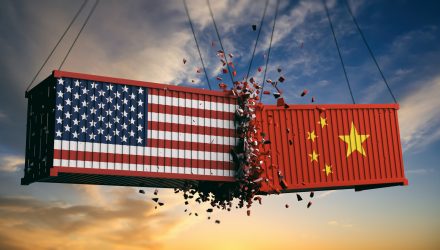Equity indexes and ETFs are trading mixed again on Wednesday, after selling off in the overnight futures session, as investors weigh tensions with China and the continuing challenges of containing the spread of the coronavirus.
The Dow Jones Industrial Average and the S&P 500 added 0.36% apiece as of nearly 1230pm EST, while the Nasdaq Composite is still struggling to reach breakeven, after testing its highs last week on Tuesday and rejecting them.
Stock index ETFs are trading mixed along with their underlying benchmarks. The SPDR Dow Jones Industrial Average ETF (DIA), SPDR S&P 500 ETF Trust (SPY), are slightly positive in early afternoon trade Wednesday, while the Invesco QQQ Trust (QQQ) is struggling to reach breakeven.
Analysts are projecting that the growing split between China and the U.S. will accelerate, damaging economic connections and driving investors to become warier when considering global markets.
Tensions escalated between the two countries earlier this week after the U.S. said two Chinese hackers were targeting American companies working on virus research and were pilfering data from companies around the world, for financial benefit and to help the Chinese government. To further exacerbate relations, the U.S. ordered the shutdown of China’s Houston consulate, stating it was required to shield intellectual property and private citizens’ data.
“Given, the Covid-19 crisis, how China handled the early stages of it and now the imposition of the national security law on Hong Kong, it’s really difficult to see how the U.S. and the West and China can get back to normal,” said Jimmy Chang, chief investment strategist at Rockefeller Asset Management. “The decoupling will only gain momentum in the coming year unless there are major policy shifts within China. At this point, it doesn’t look likely.”
Spreadex analyst Connor Campbell said President Trump’s about-face with China explained the melancholy sentiment but that there were also other factors at play as well.
“It doesn’t help that bubbling away under the surface is further diplomatic discord between the U.S. and China — Beijing is outraged that Washington has forced China’s consulate in Houston to close down — and the ever-growing prospect of a no-deal Brexit. Evidence of bad times came as the FTSE and pound fell in tandem,” he added.
The continuing explosion of coronavirus cases is also dragging on markets and investor sentiment. White House coronavirus advisor Dr. Anthony Fauci stated Wednesday that the coronavirus will likely never be completely purged from the world, a view to which President Trump stands directly opposed.
“I don’t really see us eradicating it,” Fauci, director of the National Institute of Allergy and Infectious Diseases, said during an interview with the TB Alliance. While the virus will not disappear, it’s possible to world leaders and public health officials could work to bring the virus down to “low levels,” he said.
Amid warnings from experts, including at the Centers for Disease Control and Prevention, that coronavirus cases and mortalities could spike again this fall, President Trump claimed the infection will be gone.
“The virus will disappear. It will disappear,” Trump said during a White House briefing on the pandemic.
As of now, Covid-19 continues to spread across the country, infecting over 3.9 million Americans and resulting in at least 142,090 as of Wednesday, according to data compiled by Johns Hopkins University.
For more market trends, visit ETF Trends.
